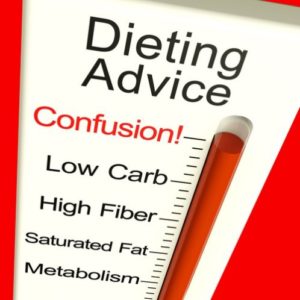Sorting Through The Dueling Diets
Author: Dr. Stephen Chaney
 Diets are a lot like politics in today’s world. Everyone is absolutely convinced their diet is the best and absolutely convinced the other diets are terrible.
Diets are a lot like politics in today’s world. Everyone is absolutely convinced their diet is the best and absolutely convinced the other diets are terrible.
Remember the nursery rhyme: “Jack Sprat could eat no fat. His wife could eat no lean…”? Today’s diets remind me of that. They run the gamut from no fat to no carbohydrates. Surely, both extremes couldn’t be healthy. Or could they?
Some diets eliminate whole food groups. That couldn’t be a good thing. Or, could it?
So, what is the best diet for you?
In today’s article, I will give you the pros and cons of these dueling diets. Before I do that, however, let me give you some principles to put things into perspective.
General Principles For Evaluating Diets
How do you sort out the claims and counterclaims associated with the various diets? More importantly, how do you know which of the claims are true and which are misleading? Here are some general principles to help you separate the wheat from the chaff. What’s the right diet for you?
We are omnivores. We can adapt to a wide variety of diets and do reasonably well. That means most people will do well on any of these diets short term.
 Anything is better than the standard American diet (SAD). It is high in sugar and refined carbohydrates. It is also high in saturated and trans fats. That is why proponents of every diet can claim that you will feel better and be healthier when you switch to their diet.
Anything is better than the standard American diet (SAD). It is high in sugar and refined carbohydrates. It is also high in saturated and trans fats. That is why proponents of every diet can claim that you will feel better and be healthier when you switch to their diet.
Processed and convenience foods are part of the problem. Most diets recommend “clean eating” (elimination of processed and convenience foods). Any diet that eliminates processed and convenience foods is likely to help you lose weight and get healthier. Caution: As soon as a diet becomes popular, food manufacturers rush in to provide pre-packaged, convenience foods to support that diet. Avoid the temptation to use those foods. Big Food Inc. does not have your best interests in mind. They are not your friends.
Most diets lead to a fairly rapid initial weight loss. This is because they restrict food choices and eliminate processed foods. When you eliminate familiar foods from someone’s diet, they instinctively eat less without even thinking about it. This rapid initial weight loss is part of the allure of almost every diet program. However, over time most people start adding back some of their favorite foods or find new foods they like, and the weight comes back.
Weight loss leads to improved blood parameters irrespective of diet composition. That is why every diet, no matter how bizarre, can claim it lowers your blood pressure, improves your blood sugar, lowers your cholesterol, and lowers your triglycerides.
Long term weight loss is virtually identical on every diet. Numerous clinical studies have compared long term weight loss on low fat diets, low carbohydrate diets, and virtually everything in between. Initial weight loss is more rapid on the low-carbohydrate diets. However, at the end of one or two years there is not a dime’s worth of difference in weight loss between any of the diets. The exception is the Vegan diet. Long term Vegans typically weigh less than their meat-eating counterparts, probably because the foods in the Vegan diet have low caloric density (fewer calories per serving).
Healthy carbs and healthy fats are more important than low carb or low fat diets. Ignore the claims and counter claims about low fat and low carb diets. Focus instead on diets that provide moderate amounts of whole grains instead of refined grains & sugar. Also focus on diets that provide moderate amounts of monounsaturated and polyunsaturated fats, especially the omega-3 polyunsaturated fats, instead of saturated and trans fats.
Focus on well balanced meals rather than individual foods. For example, moderate amounts of healthy carbohydrates will have relatively little effect on blood sugar and triglyceride levels as part of a plant-based meal that provides plenty of fiber and protein. However, those same carbohydrate-rich foods by themselves may cause a spike in both blood sugar and triglycerides.
 Plant-based diets rule. The Ornish diet (a very restrictive form of the Vegan diet) is the only diet that has been shown to reverse atherosclerosis in some people. The Vegan diet and the Mediterranean diet, which is largely plant-based, have been shown to be healthy long term. On the other hand, we simply don’t know whether low carbohydrate diets are healthy long term. Those clinical studies have not been done.
Plant-based diets rule. The Ornish diet (a very restrictive form of the Vegan diet) is the only diet that has been shown to reverse atherosclerosis in some people. The Vegan diet and the Mediterranean diet, which is largely plant-based, have been shown to be healthy long term. On the other hand, we simply don’t know whether low carbohydrate diets are healthy long term. Those clinical studies have not been done.
Saturated and trans fats are not your friends. They increase inflammation, which can have many serious long-term health consequences. In addition, the foods that are rich in saturated fats are often acid-forming foods, which can upset your acid-base balance.
We have 5 food groups for a reason. Each food group provides valuable nutrients (vitamins a & minerals) and phytonutrients. You may be able to replace the missing nutrients with supplementation, but you are unlikely to replace the phytonutrients with supplements – even those supplements that claim to be made from whole foods. You should be concerned about the long-term health consequences of any diet that eliminates whole food groups.
Low fat diets aren’t necessarily healthy. Whole food, low-fat diets like the Vegan diet are extremely healthy. However, as soon as health experts started recommending low-fat diets, Big Food Inc. stepped in to offer convenient low fat options. They simply replaced the fat with refined carbohydrates, sugar, and a witch’s brew of chemicals (Remember the part about Big Food Inc. not being your friend?). As a result, the low-fat diet consumed by most Americans is anything but healthy.
The supposed advantages of low carbohydrate diets are misleading. Low carbohydrate diets look very good when you compare them to the Big Food Inc version of the low-fat diet. However, when you compare them to something like the Vegan diet the advantages disappear.
Avoid sugar-sweetened and diet beverages. This should go without saying. Choose water instead. Add carbonation and/or a little lemon or lime juice for flavoring if necessary. Fortunately, most of the major diets exclude sugar-sweetened and diet beverages.
The Pros and Cons Of The Major Diets
It is not possible to cover each diet in depth in a single article, so this is meant to be a very brief overview of the major diets.
Low Fat Diets
The Dean Ornish Diet. This is a variation of the Vegan Diet that eliminates all oils, even vegetable oil.
Pros:
- Whole food, plant-based diet.
- All the advantages of the Vegan diet, plus it is the only diet shown to reverse atherosclerosis.
Cons:
- Very restrictive.
- Long-term adherence is low.
 The Vegan Diet. This is a whole food, plant based diet. It uses plant proteins instead of meat and plant substitutes for dairy and eggs.
The Vegan Diet. This is a whole food, plant based diet. It uses plant proteins instead of meat and plant substitutes for dairy and eggs.
Pros:
- Whole food, plant-based diet.
- Associated with lower blood pressure, blood sugar, cholesterol, triglycerides, and inflammation.
- Clinical studies show that the onset of major diseases like heart disease, cancer, and diabetes are delayed by at least 5-10 years. People on this diet live healthier, longer.
Cons:
- Long-term adherence is relatively low, but some people stick with this diet for a lifetime.
Healthy Fat, Healthy Carb Diets
The Mediterranean Diet. This diet emphasizes fresh fruits & vegetables, whole grains, fish, nuts, seeds, legumes and olive oil. It includes cheese, poultry and eggs in moderation.
- Whole food diet.
- Clinical studies show long-term adherence to the Mediterranean diet is associated with a decreased risk of heart disease , certain kinds of cancer, diabetes, ADHD, Parkinson’s, and Alzheimer’s disease.
- Relatively easy to follow.
Cons:
- Not designed specifically for weight loss. You will need to watch portion sizes and track calories if you want to lose weight on this diet.
The DASH Diet. This diet was specifically designed to help reduce the risk of hypertension and stroke. It is similar to the Mediterranean diet except that it restricts sodium and includes a wider range of lean meats and low-fat dairy products. It does not specifically include olive oil.
Pros:
- Whole food diet.
- Clinically proven to lower blood pressure as effectively as some blood pressure medications.
- Relatively easy to follow. Includes foods familiar to Americans.
Cons:
- Not designed specifically for weight loss. You will need to watch portion sizes and track calories if you want to lose weight on this diet.
Low Carb Diets
 The Paleo Diet. The Paleo diet is supposedly based on the diet of our paleolithic hunter-gatherer ancestors. The diet is high in protein & fat, and low in carbohydrates. The diet eliminates grains, sugars, refined oils, dairy, legumes, and starchy fruits & vegetables. Most of the protein comes from meats, but the animals must be grass-fed. This reduces, but does not eliminate, saturated fat and gives a modest increase in omega-3 polyunsaturated fat. Thus, the meats included in this diet are healthier than the meats in other low carbohydrate diets. However, it does not turn red meats into health foods.
The Paleo Diet. The Paleo diet is supposedly based on the diet of our paleolithic hunter-gatherer ancestors. The diet is high in protein & fat, and low in carbohydrates. The diet eliminates grains, sugars, refined oils, dairy, legumes, and starchy fruits & vegetables. Most of the protein comes from meats, but the animals must be grass-fed. This reduces, but does not eliminate, saturated fat and gives a modest increase in omega-3 polyunsaturated fat. Thus, the meats included in this diet are healthier than the meats in other low carbohydrate diets. However, it does not turn red meats into health foods.
Anthropologists tell us that the premise of the Paleo diet is faulty. The diet of our paleolithic ancestors was highly dependent on the foods available in their environment. Some were hunters and gatherers. Others lived in areas where fruits & vegetables were prevalent and game was scarcer. Still others lived in areas where starchy root vegetables were an important part of their diet. Furthermore, the enzymes required for digestion of starches are inducible. We can easily adapt to the introduction of grains into our diet.
Pros:
- Whole food diet.
- The Paleo diet is associated with several short-term benefits including weight loss, improved blood sugar control and reduced cholesterol, triglycerides & blood pressure.
Cons:
- There are no studies evaluating the long-term benefits and risks of the Paleo diet.
- It eliminates two food groups, which is likely to lead to nutritional deficiencies long term.
- The high intake of protein and saturated fat has the potential to increase the risk of kidney disease, heart disease and cancer .
- It is a very restrictive diet, which means that long-term adherence is likely to be low.
The Atkins Diet. The Atkins diet is the granddaddy of the low-fat diets. It is a very low carbohydrate diet that restricts sugars, grains, high carbohydrate fruits and vegetables. The allure of the diet is that it includes as much fatty meats and saturated fats as you want.
Pros:
- The Atkins diet is associated with several short-term benefits including weight loss, improved blood sugar control and reduced cholesterol, triglycerides & blood pressure.
Cons:
- There are no studies evaluating the long-term benefits and risks of the Atkins diet.
- Weight loss at the end of one or two years is no better than for the low-fat diets.
- The high intake of saturated fat has the potential to increase the risk of heart disease and cancer.
- It is a very restrictive diet. Long-term adherence to this diet is poor.
The Ketogenic Diet. The Ketogenic diet is even more restrictive than the Atkins diet. I have covered the pros and cons of the Ketogenic diet in a recent post, so I will refer you to that article, Is the Ketogenic Diet Safe for details. In short, the Ketogenic diet has some short-term benefits and some potential long-term risks. Ketone supplements mimic some, but not all, of the short-term benefits of the Ketogenic diet. Their long-term health risks are unknown.
What Is The Best Diet For You?
 We are all different, so there is no perfect diet for everyone. Want to know how to find a diet that works for you? Here are some things to think about.
We are all different, so there is no perfect diet for everyone. Want to know how to find a diet that works for you? Here are some things to think about.
- If you are like most Americans, almost any of these diets is better than your current diet.
- The good thing about all the diets reviewed in this article is:
- They replace refined carbohydrates & sugars with healthier alternatives (The best of the diets also replace saturated & trans fats with healthier alternatives).
- They emphasize whole foods rather than processed and convenience foods.
- They eliminate sugar-sweetened and diet beverages.
- They emphasize fresh vegetables and most include fresh fruit.
- If you are looking for rapid initial weight loss:
- The very restrictive diets at either extreme (very low fat or very low carb) are best because they eliminate familiar foods from the diet.
- The very low carb diets are slightly more effective than low fat diets initially because of water loss, but weight loss on most low carb and low fat diets is identical after 1-2 years.
- Because both the Mediterranean and DASH diets involve many familiar foods, you will need to pay more attention to portion sizes and total calories on these diets if your primary goal is to lose weight.
- If you are looking for long term weight control, the Vegan diet is best, probably because most foods in the Vegan diet have low caloric density. Multiple studies have shown that Vegans weigh less than their meat-eating counterparts.
- If you are looking for long term health benefits:
- The Vegan and Mediterranean diets are clearly your best choices. They are backed by multiple clinical studies showing they reduce the risk of heart disease, cancer, diabetes, dementia and other diseases.
- The DASH diet is probably equally healthy. However, because it was designed to control blood pressure, most clinical studies have focused only on how well it reduces blood pressure.
- There is no evidence that the low carb diets have any long-term health benefits, and there is reason to suspect they may have some long-term health risks.
- I have serious concerns about long-term health risks for any diet that:
- Eliminates whole food groups.
- Is high in saturated and trans fats.
- The effectiveness of any diet is dependent on how well you stick with it:
- The long-term adherence to any of the very restrictive diets (either low carb or low fat) is low, although some people do stick with the Vegan diet for a lifetime.
- Adherence is best with the Mediterranean and DASH diets, probably because many of the foods are familiar and readily available.
The Bottom Line
In this article I have reviewed the major low fat diets (the Dean Ornish diet and the Vegan diet), the major healthy carb, healthy fat diets (the Mediterranean diet and the DASH diet), and the major low carb diets (the Paleo diet, the Atkins diet, and the Ketogenic diet). In summary:
- If you are like most Americans, almost any of these diets is better than your current diet.
- The good thing about all these diets is:
- They replace refined carbohydrates & sugars with healthier alternatives (The best of the diets also replace saturated & trans fats with healthier alternatives).
- They emphasize whole foods rather than processed and convenience foods.
- They eliminate sugar-sweetened and diet beverages.
- They emphasize fresh vegetables and most include fresh fruit.
- If you are looking for rapid initial weight loss:
- The very restrictive diets at either extreme (very low fat or very low carb) are best because they eliminate familiar foods from the diet.
- The very low carb diets are slightly more effective than low fat diets initially because of water loss, but weight loss on most low carb and low fat diets is identical after 1-2 years.
- Because both the Mediterranean and DASH diets involve many familiar foods, you will need to pay more attention to portion sizes and total calories on these diets if your primary goal is to lose weight.
- If you are looking for long term weight control, the Vegan diet is best, probably because most foods in the Vegan diet have low caloric density. Multiple studies have shown that Vegans weigh less than their meat-eating counterparts.
- If you are looking for long term health benefits:
- The Vegan and Mediterranean diets are clearly your best choices. They are backed by multiple clinical studies showing they reduce the risk of heart disease, cancer, diabetes, dementia and other diseases.
- The DASH diet is probably equally healthy. However, because it was designed to control blood pressure, most clinical studies have focused only on how well it reduces blood pressure.
- There is no evidence that the low carb diets have any long-term health benefits, and there is reason to suspect they may have some long-term health risks.
- I have serious concerns about long-term health risks for any diet that:
- Eliminates whole food groups.
- Is high in saturated and trans fats.
- The effectiveness of any diet is dependent on how well you stick with it:
- The long-term adherence to any of the very restrictive diets (either low carb or low fat) is low, although some people do stick with the Vegan diet for a lifetime.
- Adherence is best with the Mediterranean and DASH diets, probably because many of the foods are familiar and readily available.
- For more details, read the article above.
These statements have not been evaluated by the Food and Drug Administration. This information is not intended to diagnose, treat, cure or prevent any disease.

